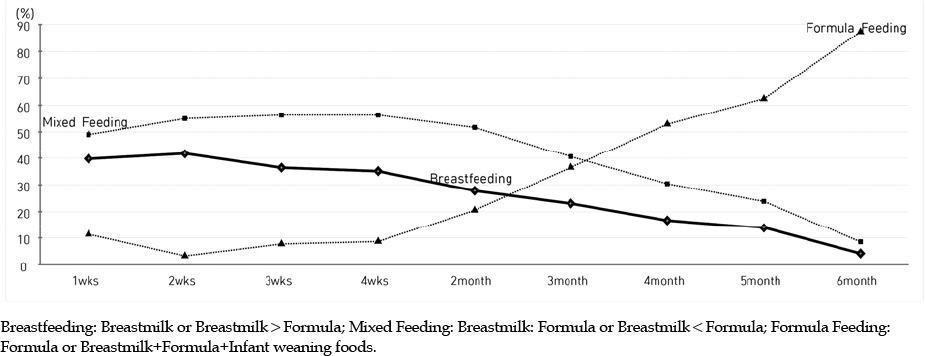Korean J Women Health Nurs.
2017 Jun;23(2):89-98. 10.4069/kjwhn.2017.23.2.89.
Impact of Breastfeeding Knowledge, Attitude, and Barriers on Breastfeeding Practice among Twin Mothers
- Affiliations
-
- 1College of Nursing, Ewha Womans University, Seoul, Korea. sookjungkang@ewha.ac.kr
- KMID: 2424144
- DOI: http://doi.org/10.4069/kjwhn.2017.23.2.89
Abstract
- PURPOSE
This study was conducted to identify effects of breastfeeding knowledge, attitude, and barriers on breastfeeding practice on twin mothers and to provide basic data for successful breastfeeding for twins.
METHODS
Participants were 151 mothers with two to twelve months-old twins. Data were collected from online support groups by an online survey.
RESULTS
Mean score for breastfeeding knowledge was 18.34±4.63, for breastfeeding attitude was 3.61±0.51, and for barriers to breastfeeding was 13.35±1.08. The breastfeeding practice rate was 27.8% when twins were two months old. The breastfeeding knowledge was significantly different depending on mother's occupation, number of children, utilization of postpartum caretaker, and age of the children. There were significant differences in the breastfeeding attitude depending on gestational week of twins, planned length of the breastfeeding, and decision period for the breastfeeding. The practice of the breastfeeding was significantly different depending on the number of children. Factors influencing the breastfeeding practice were the breastfeeding attitude (p<.05), age of mother (p<.01), and the number of children (p<.01).
CONCLUSION
An educational program and expert-led supportive system that is designed for twins are necessary, and they need to be included in prenatal care in order to have positive attitude for the breastfeeding as well as to breastfeed successfully.
Keyword
MeSH Terms
Figure
Cited by 2 articles
-
A Structural Model for Breastfeeding Behavior of First-Time Mothers
Hui Park Seol, Seang Ryu
J Korean Soc Matern Child Health. 2021;25(3):184-196. doi: 10.21896/jksmch.2021.25.3.184.Breastfeeding Success Experience of Primiparas
Sun Ok Lee, Sung Soon Na, Hee Sook Kim, Kyung Eui Bae, Mi Sun Youn, Eun Ju Oh
J Korean Soc Matern Child Health. 2022;26(4):254-269. doi: 10.21896/jksmch.2022.26.4.254.
Reference
-
1. Statistics Korea. Birth Statistics 2015 [Internet]. Daejeon: Statistics Korea;2016. cited 2017 January 5. Available from: http://kostat.go.kr/portal/korea/kor_nw/2/2/1/index.board?bmode=read&aSeq=355736.2. Centers for Disease Control and Prevention. National vital statistics reports [Internet]. Maryland: National Center for Health Statistics;2012. cited 2016 may 31. Available from: http://www.cdc.gov/nchs/govdelivery.htm.3. Martin JA, Hamilton BE, Osterman MJK. Three decades of twin births in the United States, 1980-2009 [Internet]. Maryland: National Center for Health Statistics;2015. cited 2016 May 31. Available from: http://www.cdc.gov/nchs/products/databriefs/db80.htm.4. Park SH, Lim DO. Contribution of maternal age distribution to incidence of multiple birth rates, 1997-99 and 2011-13. J Reprod Med Popul. 2015; 28:96–102.5. US Preventive Services Task Force. Primary care interventions to support breastfeeding: US preventive services task force recommendation statement. JAMA. 2016; 316(16):1688–1693.6. Ra JS, Chae SM. Breastfeeding knowledge, attitude, and nursing practice of nurses in neonatal intensive care units. Child Health Nurs Res. 2013; 19(2):76–84.
Article7. Seo JW. Benefit of breastfeeding. J Korean Soc Matern Child Health. 2004; 3:70–78. Conference Proceeding Book.8. Ooki S. Breast-feeding rates and related maternal and infants' obstetric factors in Japanese twins. Environ Health Prev Med. 2008; 13(4):187–197.
Article9. Kim BY. Comparison of factors influencing breastfeeding practice and continuation between twins and singletons [dissertation]. Seoul: Seoul National University;2014. 157.10. Kim HR. Breastfeeding trends, affecting factors and policy options for breastfeeding promotion in Korea. Health Welf Policy Forum. 2013; 201:49–60.11. Choi YH, Kim HS, Park HK, Lee YH. Analysis of factors related to breastfeeding practice of breastfeeding. Korean Nurse. 1996; 35(5):98–109.12. Lee EJ. The effect of prenatal breastfeeding education on breastfeeding practice and retention of knowledge [master's thesis]. Daegu: Keimyung University;1997. 60.13. Kim SH. Factors explaining mothers' breastfeeding satisfaction. Korean J Women Health Nurs. 2009; 15(4):270–279.
Article14. Sohn IA. A Study on the factors affecting knowledge about attitudes towards and practice of breast-feeding [master's thesis]. Seoul: Hanyang University;2007. 65.15. Jeong GH. Effect of the nursing intervention program on promoting the breast - feeding practice in primipara [dissertation]. Seoul: Ewha Womans University;1997. 133.16. Kim MS, Kim JU, Ahn YM, Bae SM, Kim MJ. The research on the breast feeding and its related factors of premature infant. Child Health Nurs Res. 2003; 9(3):272–284.17. Korea Centers for Disease Control and Prevention. Korea health statistics 2011: Korea National Health and Nutrition Examination Survey (KNHANES V-2). Seoul: Korea Centers for Disease Control and Prevention;2012. Research Report.18. Helsing E. Infant feeding and infectious illness. Copenhagen, DK: World Health Organization Regional Office for Europe;1985. Report of the World Health Organization.19. Lee SS. The 2015 national survey on fertility, family health and welfare. Sejong: Korea Institute for Health and Social Affairs;2015. p. 520. Research Report.20. Lee SO, Chung ES, Ahn SH, Moon GN, Park NH. A study of predictors of breastfeeding. Child Health Nurs Res. 2003; 9(4):368–375.21. Lee SO. A study about breastfeeding knowledge, attitude and problem of breastfeeding in early postpartum period and breastfeeding practice. Korean J Women Health Nurs. 2003; 9(2):179–188.
Article22. Kim M, Kim SH, Lee JH. Types of breastfeeding and its predictors of mothers in twenty-four months after birth. Korean J Women Health Nurs. 2011; 17(1):21–30.
Article23. Kim KN, Hyun T, Kang NM. A survey on the feeding practices of women for the development of a breastfeeding education program: Breastfeeding knowledge and breastfeeding rates. Korean J Community Nutr. 2002; 7(3):345–353.24. Yeo JH. Influencing factors in breast feeding duration. Korean J Women Health Nurs. 2005; 11(2):142–147.
Article25. Dennis CL. Breastfeeding initiation and duration: A 1990-2000 literature review. J Obstet Gynecol Neonatal Nurs. 2002; 31(1):12–32.
Article26. Mogre V, Dery M, Gaa PK. Knolwedge, attitudes and determinants of exclusive breastfeeding practice among Ghanaian rural lactation mother. Int Breastfeed J. 2016; 11:12.
Article
- Full Text Links
- Actions
-
Cited
- CITED
-
- Close
- Share
- Similar articles
-
- A Study about Breastfeeding Knowledge, Attitude and Problem of Breastfeeding in Early Postpartum Period and Breastfeeding Practice
- Factors Explaining Mothers' Breastfeeding Satisfaction
- Associations of Breastfeeding Knowledge, Attitude and Interest with Breastfeeding Duration: A Cross-sectional Web-based Study
- A Study on the Future Plans for Infant Feeding Practice and Its Associated Factors among University Students
- Breastfeeding Knowledge, Attitude, and Nursing Practice of Nurses in Neonatal Intensive Care Units


